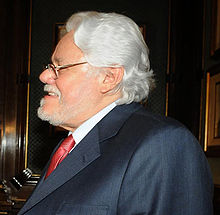Carlos Gaviria
| Carlos Gaviria Díaz | |
|---|---|
 |
|
| Senator of Colombia | |
|
In office 20 July 2006 – 20 July 2010 |
|
| Magistrate of the Constitutional Court of Colombia | |
|
In office 1 March 1993 – 1 March 2001 |
|
| Personal details | |
| Born |
Carlos Emilio Gaviria Díaz 8 May 1937 Sopetrán, Antioquia, Colombia |
| Died | 31 March 2015 (aged 77) Bogotá, Colombia |
| Nationality | Colombian |
| Political party | Alternative Democratic Pole |
| Other political affiliations |
Social and Political Front |
| Spouse(s) | María Cristina Gómez Toro (1966-present) |
| Children | Juan Carlos Gaviria Gómez Ana Cristina Gaviria Gómez Natalia Gaviria Gómez Ximena Gaviria Gómez |
| Alma mater |
University of Antioquia (LLB, LLD) Harvard Law School (MA) |
| Profession | Lawyer |
Carlos Emilio Gaviria Díaz (8 May 1937 – 31 March 2015) was a Colombian lawyer, professor and politician. He served as the 5th Chief Magistrate of the Constitutional Court of Colombia, where he served as a Magistrate from 1993 to 2001. After retiring from the Court, he went into politics becoming a Senator of Colombia in 2002, and running for President as an Alternative Democratic Pole candidate in the 2006 presidential election, ultimately losing to ex-president Álvaro Uribe Vélez, who was seeking his second term in office.
Graduated from the University of Antioquia with a Bachelor of Law in 1961, he earned a Ford Fellowship that allowed him to attend Harvard Law School, studying under professors such as Carl J. Friedrich, Paul A. Freund, and Lon L. Fuller, and where he graduated in 1971 with a MA. He returned to Colombia to enrol in the Doctorate Program of the University of Antioquia, where he earned his Doctorate of Law and Political Science in 1965 with his thesis titled Notes on an Introductory Course on the Study of Law, which earned him an Honourable Mention.
He returned to his alma mater, this time as faculty occupying various posts throughout his career in the institution and teaching different courses; along his incursion in the institution, he was Dean of the Faculty of Law from 1967 to 1969, Director of the Department of Public Law from 1974 to 1980. In 1980 he became the Vice President of the Regional Committee for the Protection of Human Rights in Medellín; for his work in this institution and in the University of Antioquia, he became involved in a campaign by paramilitary forces in Colombia to weed out their detractors, among them Gaviria; he received death threats and was forced to go into exile in Argentina. He returned later and resumed his work at the University of Antioquia as Director of the Institute of Political Science in 1988, and Deputy Rector of the University from 1989 to 1992.
...
Wikipedia
